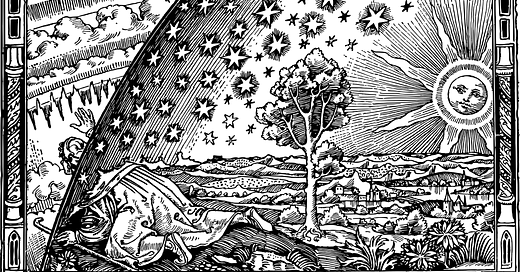

Discover more from Oxymoron
I started Oxymoron here on Substack to explore the complex and confusing world of ‘Sustainable Business’. The word sustainability comes up a lot in business these days, alongside other terms like Net Zero, Carbon Neutral, Zero Waste and Regenerative. This is all good and I’m glad that these conversations are increasingly happening, but there’s a word that’s often missing. That word is nature.
Nature is a word that we seem to mostly use to describe where we went for a walk at the weekend, the thing we are hoping to enjoy on holiday, or the stuff that David Attenborough shows us on TV. It rarely comes up in the context of business.
A couple of years ago, my wife Vineeta attended a talk by Tim Smit, creator of the Eden Project in Cornwall. In the talk, he passionately asserted that discussions about sustainability are too abstract and that nature is what we should really be talking about. This resonated with us both and so I enthusiastically updated some of the text on the Wholegrain Digital website to talk about being a ‘nature friendly business’ instead of just a ‘sustainable business’. It was an honest reflection of where I believed we should be aiming to go as a business, but as time has gone on, I’ve found myself wondering what ‘nature friendly’ really means for us as a digital agency. I can talk about sustainability all day long, but the word nature does something interesting in highlighting how disconnected we really are.
Then last summer, one of my favourite companies, Faith in Nature, became the first company in the world to appoint Nature to their board of directors. That’s right, they legally made nature one of their company directors.
OK, they didn’t literally make Nature a director, but they created the legal structure to ensure that board decisions must include a truly independent person who represents the best interests of nature. That person would have a voice and a vote, just like the other directors, but would have no other involvement in the company. It was an inspiring and visionary move that once again set my cogs in motion.
It ultimately left me with one big question that I'm still pondering a year later. What would nature truly say and do if it was appointed to a company’s board of directors? Or perhaps more profoundly, what would it do if it was fully in charge?
Let’s take a step back
To answer this question, we first need to define what we mean by nature. Looking it up in the dictionary revealed a surprising variety of definitions. The Oxford dictionary defines it as “the phenomena of the physical world collectively, including plants, animals, the landscape, and other features and products of the earth, as opposed to humans or human creations”.
The Merriam-Webster English dictionary offers us definitions including “the external world in its entirety” and “a creative or controlling force in the universe”.
The Cambridge English Dictionary defines nature as “all the animals, plants, rocks, etc. in the world and all the features forces and processes that happen or exist independently of people, such as the weather, the sea, mountains, the production of young animals or plants and growth”. That doesn’t roll of the tongue easily! Cambridge also offer us a further definition of “the force that is responsible for physical life and that is sometimes spoken of as a person”.
Apparently nature isn’t very easy to define. Looking over the definitions offered though, I think they could be summarised as either “all the things that are not human or created by humans” or “the force that does everything not done by humans”.
Is it any wonder that we see ourselves separate from nature, when the way that we define it is in specific reference to it not being us?
Despite what we are taught, I think most people will admit that we are very much a part of nature, and that we are intrinsically dependent on and woven into the tapestry of life. So what is it then? Just as in my previous post, I think Satish Kumar offers us a great insight. In a recent article in Resurgence Magazine, he states that “nature is life itself”. It’s a beautifully simple definition, and it includes us.
Natures economy
If nature is life itself, then given the job of running a business I imagine that its primary objective would be to ensure the ongoing flourishing of life. That sounds nice, but what could it mean in practice?
Well, we can find out, because nature already runs businesses. That’s right, nature is the biggest tycoon out there, it’s just that we haven’t noticed. Business is really just the word that we use to describe our own attempts to trade effort, knowledge and resources. Nature is trading effort, knowledge and resources all of the time. Trees collaborate with fungi to exchange information and food. Plants take nutrients from the soil and air in exchange for providing oxygen and other nutrients. Animals take fruits from plants in exchange for spreading and fertilising their seeds. Everything in nature is a trade that supports the flourishing of life.
With this in mind, we might imagine that nature would be the nicest boss ever to run a company, never doing anything to harm any one or any thing, human or otherwise. But this is where we encounter one of the great paradoxes of life - nature can be almost as cruel as it is kind.
If this were not true, there would be no such things as lions, hurricanes, droughts and diseases. Nature operates in cycles of birth and death, of growth and decay, of creation and destruction. If nature actually ran a business, it would likely make many dreams come true but it would also make a lot of unpopular, arguably even immoral decisions. However, it would never needlessly cause harm. Perhaps it’s leadership style would be described as “tough love“.
When we put all of natures activities together, the web of life is the ultimate economy, constantly trading to optimise the conditions for life to flourish. Its currency is life itself and economic growth is measured by an increase in the abundance and diversity of life.
Nature as the boss
With this in mind, I imagine that if nature were to run one of our human style businesses, it would measure its success not in its ability to accumulate the tokens that we call money, but on its ability to maximise the potential for life to flourish. That includes the lives of the humans within it, the local ecosystems that they live within, and the totality of life here on Earth (and possibly beyond).
It would not tolerate waste, would be infinitely creative in solving complex problems and would challenge every decision by asking whether it contributes to the overall abundance of life. It would be an intelligent and charismatic leader that is both benevolent and when needed, also ruthless. As the boss, it would not be afraid to say no to many things that we take for granted.
Profit may well be encouraged, since profit is abundance, but nature’s core management principle might well be the prioritisation of balance. It would balance nourishing the individual with the nourishing the whole, balance the short term with the long term, and carefully balance collaboration with competition to maximise the success and efficiency of the system. Whenever things got out of balance, it would make the hard decisions on where to rein things in and in a worst case scenario, it may even kill off the business in order to maintain the balance of the whole.
Can we lead like nature?
If we looked at our own businesses as if we were nature, I wonder how our management styles, decision making and problem solving abilities would compare. While we can never know for sure, I think that honest conversations about it would be a valuable addition to any business.
For people like me who have a habit of being too nice, this view of nature as the boss might feel a bit uncomfortable. The idea of creating conditions for nurturing wellbeing and abundance sound wonderful, but doing the hard stuff to maintain balance sounds far less appealing. If I’m honest though, I can see that nature’s wisdom simply highlights one of my own weaknesses as a leader that I need to work on, for the greater good.
But that’s just me. If this line of thinking sounds like something that you would like to embrace, perhaps try introducing it in conversations in your business, or if you’re really bold, check out Faith in Nature’s guide to adding Nature to your board of directors.
Finally, I’d like to say a huge thank you for the incredibly positive and generous response to my previous post on spirituality in business. I was somewhat going out on a limb and was heartened to find that it resonated with so many of you.












Thank you for sharing these thoughts. This reminded me of Chilean biologist Humberto Maturana's vision of organizations as self-creating systems that adapt to their environment through effective communication and self-awareness. Leadership, in his view, should be context-dependent, emphasizing ethical behavior, adaptability, and fostering healthy relationships. This perspective is rooted in the interconnectedness of nature, where all living systems, including humans, continuously recreate themselves through interactions with their surroundings, highlighting the importance of understanding and adapting within the natural world.
Here's a wonderful paper about his ideas and theories: "Leadership capability: an autopoietic perspective" https://eprints.whiterose.ac.uk/188344/
Love this piece, Tom. Inspired by a few writers and thinkers around this topic, I sometimes use the phrase “more-than-human world” instead of “nature”. I rather like the “more than” bit as it suggests something of potentially even greater importance / value than what we have typically centered as humans, or even that there is a lot “more” to know than we currently do.